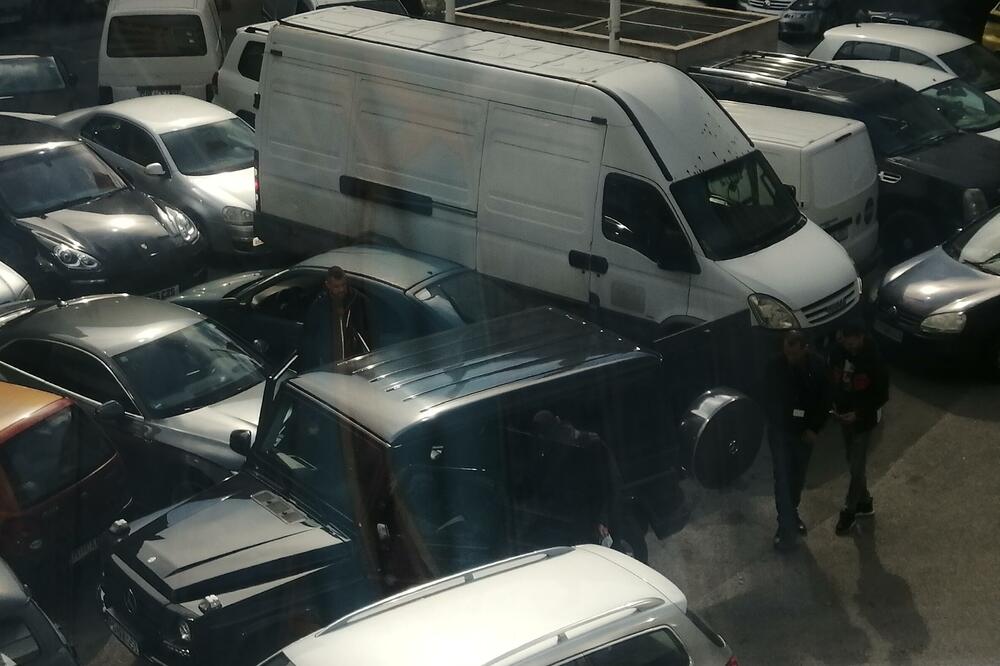Yesterday, the police took away the armored "Mercedes" G class from Pljevljak Duško Sarić (41), in order to check whether it was legally acquired and whether it was possibly used in the commission of criminal acts.
This was confirmed to "Vijesta" by the Police Administration, explaining that the car was confiscated by order of the Basic State Prosecutor's Office.
They did not specify whether this was done in any specific investigation and possibly which one.
"With the obtained order of the court, a search was made of the car, which was not registered to that person. The legality of the car is being checked, and the search was carried out with the aim of possibly finding certain traces of the commission of a criminal act", said the Police Administration.
According to the information of "Vijesti", the police officers stopped the car in which Šarić was yesterday, after which the Mercedes license plate PG-FK051 was temporarily confiscated and parked behind the building of the Podgorica Security Center.
It was there that the inspectors searched him.
To a younger brother Darko Sarić, Dušku i Jovica Lončar there was a trial on charges of laundering 19.300.000 euros.
In April 2018, the Supreme Court legally acquitted them of those charges.
The judges then confirmed the judgment of their colleagues from the Appellate Court, who stated that the banking and financial expertise of the documents from Serbia, Cyprus and Norway undoubtedly established that the money that was the subject of the indictment was not obtained by selling drugs to the criminal organization of Darko Šarić and 34 other people.
The Court of Appeal made that decision in September 2017. It was the fourth verdict for the people of Pljevlja, brought after seven years of court proceedings and three convictions.
The proceedings before that court began after the judges of the Appellate Court overturned the third conviction of the Bjelo Polje High Court, by which Šarić and Lončar were sentenced to five and a half years in prison.
From the beginning, the defendants denied the criminal offense they were charged with.
The last conviction was handed down in February 2015, when the citizens of Pljevlja were sentenced to five and a half years in prison and obliged to pay millions to the state budget - Šarić 13.617.019.083 and Lončar 5.736.859.
After the first acquittal, and the fourth in a row, Duško Šarić told "Vijesti" that the fact that he is the brother of the man accused of smuggling a ton of cocaine was more important to the judges of the Bjelo Polje High Court than to establish the truth.
"Finally, someone found the courage to make the right decision, the only one that corresponds to the truth that we did not commit the criminal offense that we were charged with... The verdict confirms what we claimed from the first day: that we did business legally and that every cent was legally acquired for which they accused us of washing", said Šarić in September 2017.
Then he also said that someone must answer the question - why they had to wait seven years for that decision.
"The question is because of whose wrong decisions we were in prison, because of whose decisions we and our families suffered media persecution for years, but also because of whose intentional or unintentional mistakes our business plans failed, from which Montenegro could only profit" , Pljevljak said then.
Dušek's older brother Darko is being tried in Belgrade in two separate proceedings for smuggling 5,7 tons of cocaine and laundering more than 20.000.000 euros.
Duško Šarić and Jovica Lončar were tried on charges of laundering 19.300.000 euros. In April 2018, the Supreme Court legally acquitted them of those charges. The judges then confirmed the judgment of their colleagues from the Appellate Court, who stated that it was undoubtedly established that the money that was the subject of the indictment was not obtained through criminal activities
Bonus video:




